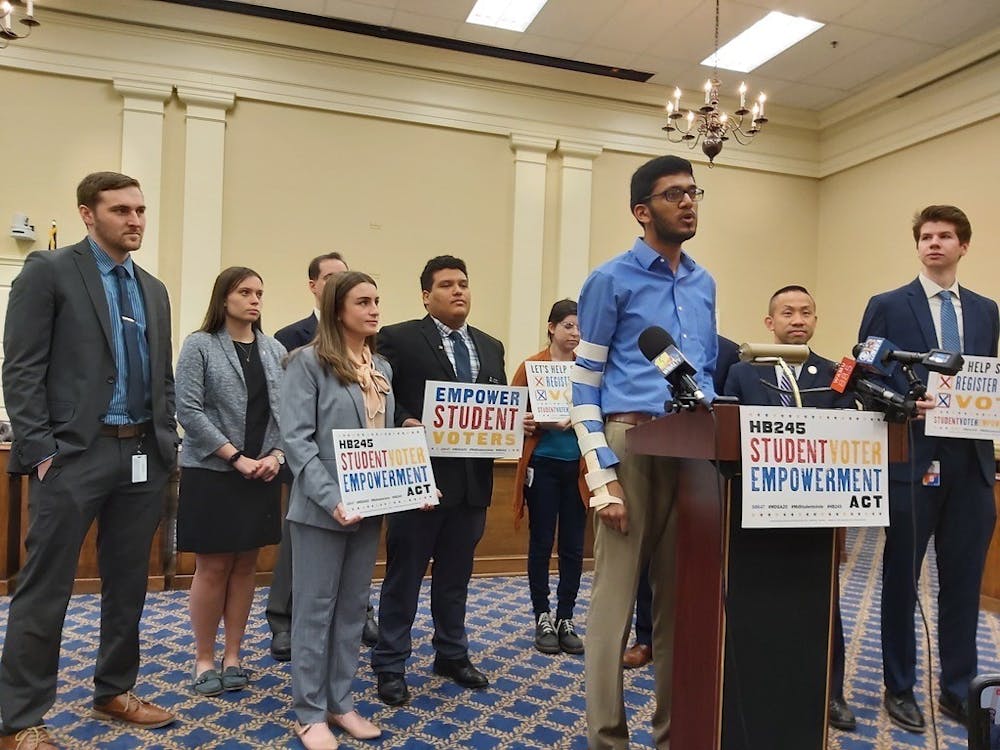The Student Voter Empowerment Act, a bill introduced in the Maryland State Senate designed to encourage university students to register and turn-out to vote, failed to pass out of committee on Feb. 28.
The Education, Health and Environmental Affairs Committee deadlocked 5-5 on the vote to advance the bill to the full Senate. The bill aimed to increase student voter participation in the state by requiring that universities create plans to encourage their students to register to vote.
A number of Hopkins students have been involved with the bill through the Maryland Public Interest Research Group (PIRG). Maryland PIRG is a student activist nonprofit organization that seeks to advocate for consumers and the public interest.
Rishi Shah, a Hopkins alum who now works as a democracy fellow at Maryland PIRG, explained that he originally got involved with PIRG because he believed in the importance of making the government more responsive to the concerns of the public.
“Because of where I was born and the opportunities I was afforded, democracy and the process of people being able to participate in democracy have always been really important to me,” he said. “When I was an undergrad student at Hopkins, I volunteered for a couple of campaigns and also helped students and community members register to vote.”
As the Maryland General Assembly is only in session for three months out of the year, House Majority Leader Eric Luedtke is also a professor at the University of Maryland. This, Shah said, contributed to his eagerness to pass the bill.
“The House majority leader works at the University of Maryland as a professor, so he’s been really passionate about the idea of increasing student voting, and it’s something that’s been on his plate for a while,” Shah said. “We started working with him on this bill before the Maryland legislative session started.”
Bills introduced in the Maryland State Senate must go through a committee hearing before being introduced to the general body of the Senate. Next, bills must be passed through an identical process that occurs in the Maryland House of Delegates. The Student Voter Empowerment Act failed at the first step in the process. Shah shared his thoughts on the bill’s failure and what he sees as the next steps in the fight for student voter engagement.
“We were definitely pretty optimistic that the bill would pass, and quite disappointed that it didn’t, at least through that committee especially,” Shah said. “But student voting isn’t something that has to be accomplished legislatively. There’s a lot of work that can be done both on the ground and on campuses.”
Junior and Maryland PIRG intern Samantha Gould, like Shah, was surprised to hear that the bill did not pass out of committee. She explained that though some universities had expressed concern about logistical issues, she did not expect the bill to be rejected at such an early stage.
“The concerns we’ve been working on mostly were from college representatives regarding the requirements for a link on the course registration website that would have gone to how to register to vote,” Gould said. “Going into the committee, we expected that maybe some amendments were going to be added to resolve those tensions. And we were going to be happy to do that.”
The recent Democratic primary elections have featured consistently low youth turnout.
On Super Tuesday, 14 states held primary contests — and not one state had participation by voters younger than 30 exceed 20 percent, according to an NPR report.
Sophomore Xandi Egginton, an intern at Maryland PIRG, emphasized the importance of fostering civic engagement among students on college campuses. He believes that students have a responsibility to influence their political futures.
“We’re the ones who are going to be living in this world for the decades to come,” he said. “We can set an example or just get voter engagement up, because it has been low, especially in Maryland, which is concerning. We should be the ones shaping the world that we’re going to live in.”
Senior Amanda Kaufman, also an intern at Maryland PIRG, agreed with Egginton about the importance of youth engagement and turnout.
“A lower voter turnout for our demographic would imply that our voice is not being heard to the same extent that other demographics are and we want to make sure that policies are suited for all people, and of equal weight among demographics,” she said. “Just as college students ourselves, we really want to make sure that we’re heard as well.”
Laura Wadsten contributed reporting to this article.





